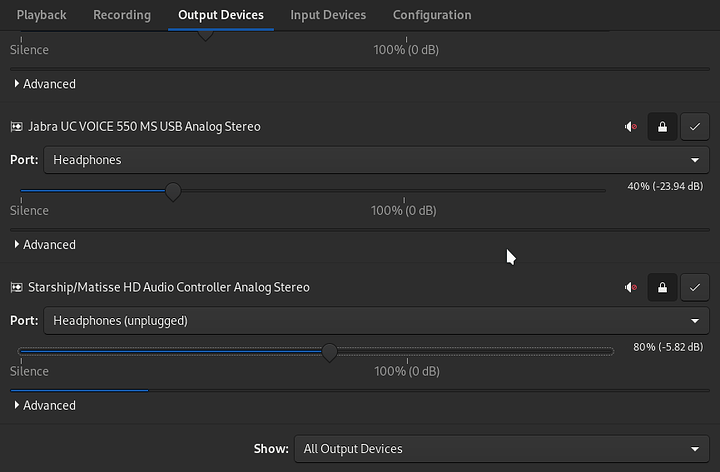I recently bought a Aorus X570 Master system and installed Arch Linux on it.
Everything seems to be working famously except for the integrated audio.
It’s detected by Pulse, but when I play audio through it I simply get no sound through my speakers. Or at least that’s what I thought at first, but as I turned my volume to 150% on my PC and cranked my speakers to absolute max I can now actually barely hear the audio coming through my speakers.
Note, this is audio levels that would usually destroy the speakers.
If I boot my PC into Windows, the speakers work fine.
Any ideas?
(I noticed the audio device is handled by snd_hda_intel which sounds like… a conflict of interest?  Is perhaps the issue that I need a different driver?)
Is perhaps the issue that I need a different driver?)
Output of uname -a:
Linux aura 5.5.3-arch1-1 #1 SMP PREEMPT Tue, 11 Feb 2020 15:35:41 +0000 x86_64 GNU/Linux
Output of lspci -nn -vvv:
...
10:00.4 Audio device [0403]: Advanced Micro Devices, Inc. [AMD] Starship/Matisse HD Audio Controller [1022:1487]
Subsystem: Gigabyte Technology Co., Ltd Starship/Matisse HD Audio Controller [1458:a0cd]
Control: I/O- Mem+ BusMaster+ SpecCycle- MemWINV- VGASnoop- ParErr- Stepping- SERR- FastB2B- DisINTx+
Status: Cap+ 66MHz- UDF- FastB2B- ParErr- DEVSEL=fast >TAbort- <TAbort- SERR-
Capabilities: [50] Power Management version 3
Flags: PMEClk- DSI- D1- D2- AuxCurrent=0mA PME(D0+,D1-,D2-,D3hot+,D3cold+)
Status: D0 NoSoftRst+ PME-Enable- DSel=0 DScale=0 PME-
Capabilities: [64] Express (v2) Endpoint, MSI 00
DevCap: MaxPayload 256 bytes, PhantFunc 0, Latency L0s <4us, L1 unlimited
ExtTag+ AttnBtn- AttnInd- PwrInd- RBE+ FLReset+ SlotPowerLimit 0.000W
DevCtl: CorrErr- NonFatalErr- FatalErr- UnsupReq-
RlxdOrd+ ExtTag+ PhantFunc- AuxPwr- NoSnoop+ FLReset-
MaxPayload 256 bytes, MaxReadReq 512 bytes
DevSta: CorrErr+ NonFatalErr- FatalErr- UnsupReq+ AuxPwr- TransPend-
LnkCap: Port #0, Speed 16GT/s, Width x16, ASPM L0s L1, Exit Latency L0s <64ns, L1 <1us
ClockPM- Surprise- LLActRep- BwNot- ASPMOptComp+
LnkCtl: ASPM Disabled; RCB 64 bytes Disabled- CommClk+
ExtSynch- ClockPM- AutWidDis- BWInt- AutBWInt-
LnkSta: Speed 16GT/s (ok), Width x16 (ok)
TrErr- Train- SlotClk+ DLActive- BWMgmt- ABWMgmt-
DevCap2: Completion Timeout: Range ABCD, TimeoutDis+, LTR-, OBFF Not Supported
AtomicOpsCap: 32bit- 64bit- 128bitCAS-
DevCtl2: Completion Timeout: 50us to 50ms, TimeoutDis-, LTR-, OBFF Disabled
AtomicOpsCtl: ReqEn-
LnkSta2: Current De-emphasis Level: -3.5dB, EqualizationComplete-, EqualizationPhase1-
EqualizationPhase2-, EqualizationPhase3-, LinkEqualizationRequest-
Capabilities: [a0] MSI: Enable+ Count=1/1 Maskable- 64bit+
Address: 00000000fee00000 Data: 0000
Capabilities: [100 v1] Vendor Specific Information: ID=0001 Rev=1 Len=010 <?>
Capabilities: [150 v2] Advanced Error Reporting
UESta: DLP- SDES- TLP- FCP- CmpltTO- CmpltAbrt- UnxCmplt- RxOF- MalfTLP- ECRC- UnsupReq- ACSViol-
UEMsk: DLP- SDES- TLP- FCP- CmpltTO- CmpltAbrt- UnxCmplt- RxOF- MalfTLP- ECRC- UnsupReq- ACSViol-
UESvrt: DLP+ SDES+ TLP- FCP+ CmpltTO- CmpltAbrt- UnxCmplt- RxOF+ MalfTLP+ ECRC- UnsupReq- ACSViol-
CESta: RxErr- BadTLP- BadDLLP- Rollover- Timeout- AdvNonFatalErr+
CEMsk: RxErr- BadTLP- BadDLLP- Rollover- Timeout- AdvNonFatalErr+
AERCap: First Error Pointer: 00, ECRCGenCap- ECRCGenEn- ECRCChkCap- ECRCChkEn-
MultHdrRecCap- MultHdrRecEn- TLPPfxPres- HdrLogCap-
HeaderLog: 00000000 00000000 00000000 00000000
Capabilities: [2a0 v1] Access Control Services
ACSCap: SrcValid- TransBlk- ReqRedir- CmpltRedir- UpstreamFwd- EgressCtrl- DirectTrans-
ACSCtl: SrcValid- TransBlk- ReqRedir- CmpltRedir- UpstreamFwd- EgressCtrl- DirectTrans-
Capabilities: [370 v1] Transaction Processing Hints
Device specific mode supported
Steering table in TPH capability structure
Kernel driver in use: snd_hda_intel
Kernel modules: snd_hda_intel
...
Output of pacmd list-sinks:
...
index: 5
name: <alsa_card.pci-0000_10_00.4>
driver: <module-alsa-card.c>
owner module: 11
properties:
alsa.card = "1"
alsa.card_name = "HD-Audio Generic"
alsa.long_card_name = "HD-Audio Generic at 0xf7a00000 irq 113"
alsa.driver_name = "snd_hda_intel"
device.bus_path = "pci-0000:10:00.4"
sysfs.path = "/devices/pci0000:00/0000:00:08.1/0000:10:00.4/sound/card1"
device.bus = "pci"
device.vendor.id = "1022"
device.vendor.name = "Advanced Micro Devices, Inc. [AMD]"
device.product.id = "1487"
device.product.name = "Starship/Matisse HD Audio Controller"
device.string = "1"
device.description = "Starship/Matisse HD Audio Controller"
module-udev-detect.discovered = "1"
device.icon_name = "audio-card-pci"
profiles:
input:analog-stereo: Analog Stereo Input (priority 65, available: no)
output:analog-stereo: Analog Stereo Output (priority 6500, available: unknown)
output:analog-stereo+input:analog-stereo: Analog Stereo Duplex (priority 6565, available: no)
output:analog-surround-21: Analog Surround 2.1 Output (priority 1300, available: unknown)
output:analog-surround-21+input:analog-stereo: Analog Surround 2.1 Output + Analog Stereo Input (priority 1365, available: no)
output:analog-surround-40: Analog Surround 4.0 Output (priority 1200, available: unknown)
output:analog-surround-40+input:analog-stereo: Analog Surround 4.0 Output + Analog Stereo Input (priority 1265, available: no)
output:analog-surround-41: Analog Surround 4.1 Output (priority 1300, available: unknown)
output:analog-surround-41+input:analog-stereo: Analog Surround 4.1 Output + Analog Stereo Input (priority 1365, available: no)
output:analog-surround-50: Analog Surround 5.0 Output (priority 1200, available: unknown)
output:analog-surround-50+input:analog-stereo: Analog Surround 5.0 Output + Analog Stereo Input (priority 1265, available: no)
output:analog-surround-51: Analog Surround 5.1 Output (priority 1300, available: unknown)
output:analog-surround-51+input:analog-stereo: Analog Surround 5.1 Output + Analog Stereo Input (priority 1365, available: no)
output:iec958-stereo: Digital Stereo (IEC958) Output (priority 5500, available: unknown)
output:iec958-stereo+input:analog-stereo: Digital Stereo (IEC958) Output + Analog Stereo Input (priority 5565, available: no)
off: Off (priority 0, available: unknown)
active profile: <output:analog-stereo>
sinks:
alsa_output.pci-0000_10_00.4.analog-stereo/#3: Starship/Matisse HD Audio Controller Analog Stereo
sources:
alsa_output.pci-0000_10_00.4.analog-stereo.monitor/#5: Monitor of Starship/Matisse HD Audio Controller Analog Stereo
ports:
analog-input-front-mic: Front Microphone (priority 8500, latency offset 0 usec, available: no)
properties:
device.icon_name = "audio-input-microphone"
analog-input-rear-mic: Rear Microphone (priority 8200, latency offset 0 usec, available: no)
properties:
device.icon_name = "audio-input-microphone"
analog-input-linein: Line In (priority 8100, latency offset 0 usec, available: no)
properties:
analog-output-lineout: Line Out (priority 9000, latency offset 0 usec, available: yes)
properties:
analog-output-headphones: Headphones (priority 9900, latency offset 0 usec, available: no)
properties:
device.icon_name = "audio-headphones"
iec958-stereo-output: Digital Output (S/PDIF) (priority 0, latency offset 0 usec, available: unknown)
properties:
...

 My audio volume is just about 1% of what it should be.
My audio volume is just about 1% of what it should be.


